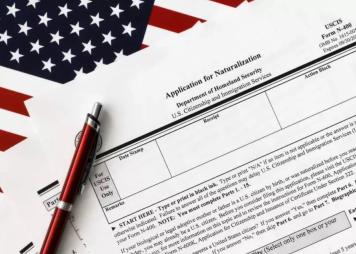Good Moral Character for U.S. Citizenship

What may be good for one person may not be good enough for another. However, USCIS has very specific guidelines to qualify good moral character.
If you are concerned about your application getting denied due to this requirement, the best thing you can do is speak with a local nonprofit that offers legal counsel. In this guide we explain the basics and what may keep you from having good moral character according to USICS.
What is Good Moral Character
If you wonder about the consequences of any illicit behavior prior to you getting your green card or while having it, it is extremely important to seek expert legal advice before applying for citizenship. Good moral character (GMC) is defined as individuals who:
- Have resided in the country for a specific period of time (most commonly 5 years)
- Have been a person of “good moral character” during this period
- This means that a person has not caused or gotten involved in problems with the law during the time they have lived in the U.S. and has followed all U.S. laws
If a person is convicted of a crime, USCIS will take that conviction into account when deciding whether or not the person has good moral character depending on the person’s case.
What is a conviction?
Convictions are not limited to severe criminal behavior. Paying a fine in court, or a parking ticket also qualifies as breaking the law. Convictions fall into five categories:
- Convictions that give you permanent bad moral character and lead to jail (like murder or felony)
- Convictions that make you deportable, even if you have good moral character (like violence)
- Convictions that may lead USCIS to find you do not have good moral character (like a DUI)
- Convictions that USCIS usually won't find to be violations of good moral character (like a parking ticket)
- Multiple convictions (repeated offenses of the same or different violation)
Convictions and USCIS Applications?
A criminal conviction can impact any USCIS application. During the application process, USCIS will review and research an applicant’s background records and, if applicable, their sponsor’s. Only a USCIS officer has the discretion to decide if a conviction, even a minor one, can be overlooked or considered.
Certain convictions disqualify U.S. citizens from sponsoring an applicant as well. This is why understanding your application form, document requitements, and specific case needs is also important.
What is a Waiver of Inadmissibility?
In some cases, an applicant can include a “waiver of inadmissibility” in their application, which is used to excuse criminal history from their application. To file a waiver of inadmissibility, the immigrant must prove that:
- Their admission to the country would not pose a danger to anyone in the U.S.
- The denial of admission would result in extreme hardship to a qualifying relative, like a spouse or child
- Not all criminal offenses qualify for a waiver of inadmissibility. Severe crimes, like drug convictions, are not excused by a waiver
Filling out a USCIS Application with Good Moral Character
Overall, it is important to be honest when filling out your USCIS application. In the green card and citizenship forms there are about 20 questions that you need to answer. Not answering these questions completely or honestly can be immediate reason for USCIS to deny your application. If you have a conviction in your home country or in any other country, you must disclose it and provide the documents associated with the conviction.
Make sure you are presenting yourself accurately by getting support services from an immigrant support organization near you. Get started with finding this help through our nonprofit organization directory.
The information provided on www.onepercentforamerica.org is intended for general informational purposes only. It should not be considered as professional advice or a substitute for seeking professional guidance.



